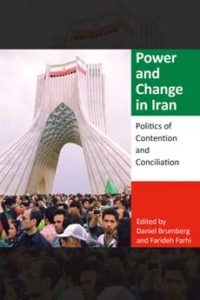 Iran‘s Supreme Leader Ayatollah Ali Khamenei accused the government on Monday of economic mismanagement and said it needed to improve its performance to help the country better weather newly reimposed U.S. sanctions, the AP reports:
Iran‘s Supreme Leader Ayatollah Ali Khamenei accused the government on Monday of economic mismanagement and said it needed to improve its performance to help the country better weather newly reimposed U.S. sanctions, the AP reports:
Washington reimposed strict sanctions against Iran last Tuesday and U.S. President Donald Trump has threatened to penalize firms from other countries that continue to operate in the Islamic Republic. Iran has denounced the sanctions as “U.S. unilateralism.”
“More than the sanctions, economic mismanagement (by the government) is putting pressure on ordinary Iranians … I do not call it betrayal but a huge mistake in management,” Iranian state TV quoted Khamenei as saying, in his first reaction to the reimposition of U.S. sanctions.
 “The corrupt people should be punished firmly,” said Khameni, who approved last week a request by the judiciary to set up special courts to deal with financial crimes, RFE/RL adds:
“The corrupt people should be punished firmly,” said Khameni, who approved last week a request by the judiciary to set up special courts to deal with financial crimes, RFE/RL adds:
On August 12, judiciary spokesman Gholamhossein Mohseni Ejei said 67 people had been arrested in recent weeks as part of a crackdown against corruption, while more than 100 others have been barred from leaving the country.
“Today, [Iranian] officials increasingly talk about the need to combat corruption at every level,” Human Rights Watch (HRW) said in an August 10 statement. “Yet to do so requires an independent judiciary that ensures due process rights for all those accused,” the rights watchdog added.
Experts expect that the return of U.S. sanctions will intensify public unrest, Foreign Policy adds.
 “As sanctions snap back, I think you’re going to see more demonstrations,” said Alireza Nader, an independent Iran analyst. “But it’s not just about the economy—the vast majority of people hate the Islamic Republic.” He noted that the 1979 revolution was sparked by mass protests and strikes, and said he sees a similar dynamic at work today.
“As sanctions snap back, I think you’re going to see more demonstrations,” said Alireza Nader, an independent Iran analyst. “But it’s not just about the economy—the vast majority of people hate the Islamic Republic.” He noted that the 1979 revolution was sparked by mass protests and strikes, and said he sees a similar dynamic at work today.
Suzanne Maloney, an Iran expert at the Brookings Institution, said that while the regime has signaled resistance, there was some talk in Iran about the need to resolve the crisis. “There is a pragmatic recognition that they have to take advantage of any option that might prevent itself,” she told the FT:
Karim Sadjadpour (right), an Iran expert at the Carnegie Endowment,  said although Iran faced a different situation to North Korea, it might eventually be forced to the table. He said the primary goal of 79-year-old Ayatollah Khamenei was “to preserve his rule for as long as he’s alive”, adding: “He has defied the US for four decades and his instincts will be to shun Trump. But if the economic pressure becomes too great he may have to swallow a bitter pill and accede to negotiations with the US.”
said although Iran faced a different situation to North Korea, it might eventually be forced to the table. He said the primary goal of 79-year-old Ayatollah Khamenei was “to preserve his rule for as long as he’s alive”, adding: “He has defied the US for four decades and his instincts will be to shun Trump. But if the economic pressure becomes too great he may have to swallow a bitter pill and accede to negotiations with the US.”
Iran’s theocrats have been under growing pressure, The New Yorker’s Robin Wrights adds:
 Since December, sporadic demonstrations in nearly all of the country’s thirty-one provinces have protested unemployment; rising prices; the plummeting value of the country’s currency, the rial; delayed wages; and other economic hardships. The rial has lost more than half of its value since April, generating crisis runs on foreign currency and gold. The demonstrations have occasionally turned political, with videos on social media showing some protesters chanting
Since December, sporadic demonstrations in nearly all of the country’s thirty-one provinces have protested unemployment; rising prices; the plummeting value of the country’s currency, the rial; delayed wages; and other economic hardships. The rial has lost more than half of its value since April, generating crisis runs on foreign currency and gold. The demonstrations have occasionally turned political, with videos on social media showing some protesters chanting  for the ouster of President Hassan Rouhani.
for the ouster of President Hassan Rouhani.
The Hudson Institute hosts a discussion on Iran: Protests, Sanctions and Regime Viability, featuring Alireza Nader, policy analyst at the Rand Corporation; Behnam Taleblu, research fellow with the Foundation for Defense of Democracies; Mariam Memarsadeghi, co-founder and co-director of Tavaana; and Mike Pregent, senior fellow at the Hudson Institute.
12 noon: August 15, 2018







